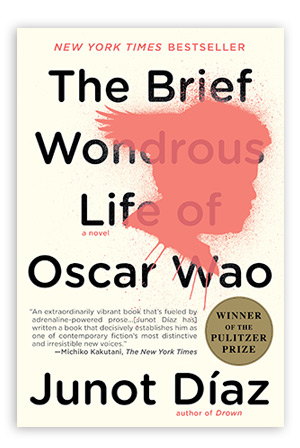Table of Contents
Junot Díaz is Synonymous with Vibrant Storytelling
Junot Díaz, a prominent figure in contemporary American literature, has carved a niche for himself with his vibrant storytelling prowess and profound cultural insights. Known for his distinctive narrative style, which artfully combines crisp, dynamic English with rich, evocative Spanglish, Díaz offers an authentic portrayal of the Dominican-American experience. Through his literary works, he not only achieves critical acclaim but also holds up a reflective mirror to society, illuminating the joys, struggles, and complexities of life. His narratives are peopled with characters that are both richly drawn and deeply flawed, reflecting the multifaceted nature of human experience. His seminal work, “The Brief Wondrous Life of Oscar Wao,” which won the Pulitzer Prize for Fiction in 2008, is a compelling exploration of love, fate, and the curse that has haunted Oscar’s family for generations. The story traces its lineage back to the Dominican Republic.
Junot Díaz’s works extend beyond mere storytelling to act as powerful vehicles for cultural commentary and critique. His portrayal of the immigrant experience, the complex identity negotiations, and the intergenerational trauma associated with displacement and diaspora are particularly poignant. These themes resonate with many, making his books not only popular but also pivotal in academic and social discussions about identity in America.

Literary Roots and Cultural Background
Díaz’s early life in the Dominican Republic, imbued with the island’s rich traditions and folklore, contrasts vividly with his experiences in New Jersey. The colorful and fantastical elements of Dominican folklore, with its tales of magic and myth, clash and blend with the harsh realities of urban life in America. In his storytelling, Díaz masterfully mixes these two worlds, creating a narrative that is both grounded in reality and elevated by imagination. This unique fusion not only enriches his narratives but also brings a fresh, authentic voice to American literature, highlighting the nuanced experiences of the Dominican diaspora. Through his work, Díaz invites readers into a world where the magical realism of his cultural heritage dances with the stark truths of immigrant life. The experience offers a profound exploration of identity, culture, and belonging.
Impact of "The Brief Wondrous Life of Oscar Wao"
In “The Brief Wondrous Life of Oscar Wao,” Junot Díaz dives deeply into the heart of Dominican history and the personal sagas of its people. Diaz does this through the poignant and often humorous story of Oscar de León. Oscar, a corpulent, nerdy Dominican adolescent from Paterson, New Jersey, harbors dreams of literary greatness, aspiring to become the Dominican equivalent of J.R.R. Tolkien. His life story is marked by a tragicomic tone that resonates deeply with readers, capturing the complex interplay of ambition, cultural identity, and the harsh realities of life. This remarkable novel, which garnered the prestigious Pulitzer Prize for Fiction in 2008, masterfully interlaces personal misfortunes with the tumultuous political landscape of the Dominican Republic during the era of Rafael Trujillo’s dictatorship. The narrative richness of the novel is further enhanced by Díaz’s innovative use of footnotes, which serve as a conduit to explore the deep historical wounds inflicted by the Trujillo regime. These annotations provide a scholarly depth to the novel, enriching the reader’s understanding of the historical context that shapes the characters’ lives.
One of the novel’s most moving chapters, “The Three Heartbreaks of Belicia Cabral,” intimately portrays the life of Oscar’s mother during her youth in the Dominican Republic. This section stands out as a testament to Díaz’s exceptional talent for character development and his deft ability to integrate the Dominican Republic’s fraught history into the fabric of individual life stories. Belicia’s narrative, marked by profound personal losses, mirrors the larger narrative of oppression under Trujillo’s rule. Her individual heartbreaks, layered with her indomitable will to survive and defy her circumstances, vividly capture the essence of the Dominican spirit faced with authoritarian oppression. This chapter not only enriches the novel’s narrative complexity but also serves as a crucial piece in understanding the emotional and historical landscape that shapes the characters’ lives and identities. Through Belicia’s eyes, readers experience the intersection of personal resolve and historical forces, making her story a compelling and integral element of Díaz’s literary mosaic.

Literary Style and Narrative Technique
Díaz’s work provides a lens through which to view the complexities of identity in the context of diaspora and displacement. His characters often grapple with their identities, caught between two cultures and trying to find a place where they belong. This theme is not only central to his characters’ experiences but also reflective of Díaz’s personal journey. Looking to the future, Junot Díaz continues to influence aspiring writers, especially from Latino backgrounds, encouraging them to tell their own stories with honesty and vigor. His contributions to literature and his ability to highlight socio-political issues through narrative continue to resonate with readers around the world.
Bottom Line
Junot Díaz’s contribution to literature is rich and varied; he is much more than just a writer—he is a masterful storyteller, an esteemed educator, and a resounding voice championing the often overlooked or marginalized communities. His literary brilliance is particularly evident in his adeptness at weaving together personal experiences with broader historical contexts, thereby crafting narratives that are not only profoundly educational but also deeply emotive. His critically acclaimed novel, “The Brief Wondrous Life of Oscar Wao,” serves as a beacon of his narrative prowess. This book does more than just tell a story; it sheds light on the nuanced struggles faced by the Dominican diaspora, weaving a tapestry of tales that reflect both the pain and resilience of the immigrant experience. This novel has significantly enriched the American literary landscape, adding depth and diversity to the canon with its intricate exploration of identity, the burdens of oppressive regimes, and the redemptive power of storytelling.
“The Brief Wondrous Life of Oscar Wao” stands as a profound testament to Díaz’s impactful presence in the world of contemporary literature. It offers readers a multifaceted look at the complexities of identity, from the intimate struggles of individual characters to the sweeping forces of history that shape their lives. Through his vivid depictions of both New York’s vibrant, bustling city life and the Dominican Republic’s charged political landscape, Díaz captures the essence of these settings and their influence on the diaspora’s psyche. Junot Díaz remains a pivotal figure in the realm of modern storytelling, consistently pushing the boundaries of traditional literature with his innovative style and thematic boldness. His works not only resonate with a wide array of readers but also challenge and inspire the literary community to delve deeper into the lesser-told stories of our world. Through his compelling narratives and unforgettable characters, Díaz continues to invigorate and transform the landscape of American literature.




